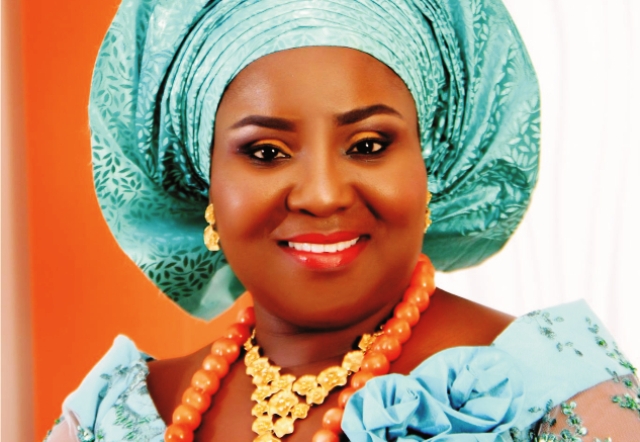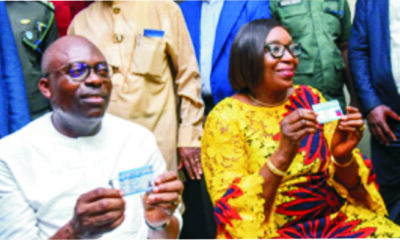News
N260bn NDDC Budget Tears Reps Apart

Members of the House of Representatives Committee on Niger Delta Development Commission, yesterday, expressed disgust over the sitting of most of the agency’s projects in the constituency of the Chairman of the committee, Nicholas Mutu.
The commission’s Acting Managing Director, Mrs. Ibim Semenitari, had presented the 2016 budget based on a projected revenue of N260billion to the committee for approval.
The figure was short of the 2015 projection of N300.1billion by 15.4 per cent.
It was a session where Semenitari also complained that due to funding challenges, work had yet to start on 788 out of the 867 projects awarded in different sectors in the region.
“Different reasons could be adduced for this setback, but a possible reason may be that contractors are not too sure of payments as the commission has some financial challenges.
“However, 46 of the projects are ongoing, out of which 35 have been completed and commissioned,” the former Commissioner for Information in Rivers State, told the committee.
Semenitari stated that all the 2015 projects were “rolled over” to 2016.
She added that the 2015 projects brought the total stock of NDDC’s projects to “over 7,000.”
But, drama started when lawmakers picked quarrels that most projects were domiciled in Mutu’s Bomadi and Patani Constituency in Delta State.
They also criticised the crowding of projects in the Isoko Constituency of the Minority Leader of the House, Mr. Leo Ogor, in Delta State, to the exclusion of other communities.
One embittered member from Ugheli-West/North, Solomon Awhinawhin, pointedly accused Mutu of influencing the projects to his area.
He fumed, “We cannot pass this budget. I hope we are not saying that the budget will pass today? It is full of fraud.
“The chairman has up to 90 per cent of the projects; the Minority Leader too has his own share of many projects.
“Ugheli-West/North produces the largest gas resources in the whole of Africa if not the entire world. There is no single project in this budget for them.
“Let me tell you, this neglect of Ugheli was why Niger Delta Avengers emerged. We are not passing the budget today because we have to represent all the communities in the Niger Delta adequately.”
Another member from Ondo State, Akinjo Victor, also protested that his Ileja area was not adequately captured in the N71billion voted for regional projects.
He observed that while projects were duplicated in other areas of the Niger Delta, his own community had no projects.
“There is so much duplication of projects, which makes the whole exercise fraudulent,” he stated.
Mutu kept mute and never addressed any of the allegations.
The Chairman, House Committee on Public Petitions, Mr. Uzoma Nkem-Abonta, cited a particular road in Abia State, where he alleged that it had been duplicated in the sum of N1.7bn.
“They did this road and the asphalt overlay; I have seen another N1.7bn, it is for the same portion on the same road by another contractor,” Nkem-Abonta added.
However, Semenitari calmly explained to the angry lawmakers that there was no deliberate decision since he assumed office this year to sideline any community.
She noted that the alleged lopsided projects were actually inherited and that the commission had to keep funding them as rolled over projects.
For states like Ondo, Imo and Abia where members also raised complaints, the MD gave the assurance that efforts would be made to “streamline” some of the projects in a bid to spread them.
Giving the highlights of the budget, Semenitari said in 2016, the NDDC budgeted N231.2billion for capital development projects, down from the N271.4billion budgeted in 2015.
“The 2016 figure represents 89 per cent of the total revenue of N260.1billion. The commission has given priority to adequately providing for ongoing projects”, she said.
On the recurrent component, Semenitari told lawmakers that the commission would spend N17.56billion on personnel cost, up from N16.13billion in 2015 to cover for staff promotions.
“Overhead for 2015 was N10.55billion. In 2016, we are proposing N9.98billion. The decrease by 3.6 per cent against 2015 is as a result of the commission’s resolve to efficiently manage its processes”, she informed lawmakers.
The committee later asked journalists to leave the venue so that members could discuss more freely with the NDDC’s officials.
News
Tinubu Lauds Dangote’s Diesel Price Cut, Foresees Economic Relief

President Bola Tinubu, yesterday, applauded Dangote Oil and Gas Limited for reducing the price of Automotive Gas Oil, also known as diesel, from N1,650 to N1,000 per litre.
The Dangote Group recently reviewed downwards the gantry price of AGO from N1,650 to N1,000 per litre for a minimum of one million litres of the product, as well as providing a discount of N30 per litre for an offtake of five million litres and above
Tinubu described the move as an “enterprising feat” and said, “The price review represents a 60 per cent drop, which will, in no small measure, impact the prices of sundry goods and services.”
In a statement signed by his Special Adviser on Media and Publicity, Ajuri Ngelale, Tinubu affirmed that Nigerians and domestic businesses are the nation’s surest transport and security to economic prosperity.
The statement is titled ‘President Tinubu commends Dangote Group over new gantry price of diesel.’
Tinubu also noted the Federal Government’s 20 per cent stake in Dangote Refinery, saying such partnerships between public and private entities are essential to advancing the country’s overall well-being.
Therefore, he called on Nigerians and businesses to, at this time, put the nation in priority gear while assuring them of a conducive, safe, and secure environment to thrive.
This statement comes precisely a week after Dangote met President Tinubu in Lagos, where he said Nigerians should expect a drop in inflation given the cut in diesel pump prices.
“In our refinery, we have started selling diesel at about ¦ 1,200 for ¦ 1,650 and I’m sure as we go along…this can help to bring inflation down immediately,” Dangote told journalists after he paid homage to President Bola Tinubu at the latter’s residence to mark Eid-el-Fitr.
The businessman said his petroleum refinery had been selling diesel at N1,200 per litre, compared to the previous price of N1,650–N1,700.
He expressed hopes that Nigeria’s economy will improve, as the naira has made some gains in the foreign exchange market, dropping from N1,900/$ to the current level of N1,250 – N1,300.
Dangote said this rise in value has sparked a gradual drop in the price of locally-produced goods, such as flour, as businesses are paying less for diesel. Therefore, he asserted that the reduced fuel costs would drive down inflation in the coming months.
“I believe that we are on the right track. I believe Nigerians have been patient and I also believe that a lot of goodies will now come through.
“There’s quite a lot of improvement because, if you look at it, one of the major issues that we’ve had was the naira devaluation that has gone very aggressively up to about ¦ 1,900.
“But right now, we’re back to almost ¦ 1,250, ¦ 1,300, which is a good reprieve. Quite a lot of commodities went up.
“When you go to the market, for example, something that we produce locally, like flour, people will charge you more. Why? Because they’re paying very high prices on diesel,” he explained.
He argued that the reduced diesel price would have “a lot of impact” on local businesses.
“Going forward, even though the crude prices are going up, I believe people will not get it much higher than what it is today, N1,200.
“It might be even a little bit lower, but that can help quite a lot because if you are transporting locally-produced goods and you were paying N1,650, now you are spending two-thirds of that amount, N1,200. It’s a lot of difference. People don’t know.
“This can help bring inflation down immediately. And I’m sure when the inflation figures are out for the next month, you’ll see that there’s quite a lot of improvement in the inflation rate, one step at a time. And I’m sure the government is working around the clock to ensure things get much better,” Dangote added.
He also urged captains of industry to partner with the government to improve the lives of citizens.
“You can’t clap with one hand,” said the businessman, adding, “So, both the entrepreneurs and the government need to clap together and make sure that it is in the best interest of everybody.”
News
Court Halts Amaewhule-Led Assembly From Extending LG Officials’ Tenure

The Rivers State High Court sitting in Port Harcourt has issued an interim injunction directing the maintenance of status quo ante belum following the move by the Martin Amaewhule-led Assembly in Rivers State to extend the tenure of the elected local government councils’ officials.
The Amaewhule-led Assembly, which is loyal to the Minister of Federal Capital Territory, Nyesom Wike, had amended the Local Government Law Number 5 of 2018 and other related matters.
Amaewhule, explained that the amendments of Section 9(2), (3) and (4)of the Principal Law was to empower the House of Assembly via a resolution to extend the tenure of elected chairmen and councilors, where it is considered impracticable to hold local government elections before the expiration of their three years in office.
But the court asked all the parties to maintain the status quo ante belum pending the hearing and determination of motion on notice for the interlocutory injunction.
The court presided over by G.N. Okonkwo also ordered that the claimant/applicant would enter into an undertaking to indemnify the defendants in the sum of N5million should the substantive case turned out to be frivolous.
The court fixed April 22, 2024 to hear the motion on notice for interlocutory injunction.
Okonkwo also issued an order of substituted service of the motion on notice for interlocutory injunction, originating summons and other subsequent processes on the defendants.
The orders were made following a suit filed by Executive Chairman, Opobo-Nkoro, Enyiada Cooky-Gam; Bonny, Anengi Claude-Wilcox; and five other elected council officials challenging the decision of the Amaewhule-led House of Assembly to extend the tenure of local government areas.
Also named as defendants in the suit are the Governor of Rivers State, the Government of Rivers State and the Attorney-General of Rivers State.
The claimants/applicants are praying the court for a declaration that under section 9(1) of the Rivers State Local Government Amendment Law number 5 of 2018 the tenure of office of the chairmen and members of the 23 local government councils of Rivers State is three years
A declaration that the tenure of office of the elected chairmen and members of the local government areas would expire on the 17th of June 2024 having commenced on the 18th of June 2021 when they were sworn in.
A declaration that the defendants cannot in any manner or form extend the tenure of office of the chairmen and members of the local government areas after the expiration of their tenure.
An order of perpetual injunction restraining the defendants from extending the tenure of office of the chairmen and members of the local government areas.
An order of perpetual injunction restraining the 28th, 29th and 30th defendants (the Governor, the Government House and the Attorney-General) from giving effects to any purported extension of the tenure of the chairmen and members of the local government areas.
They also prayed for an order of interlocutory injunction directing all the defendants to maintain the status quo by not elongating the three-year tenure of the chairmen and councilors.
The claimants further sought an order of interlocutory injunction restraining the defendants from extending the tenures of the chairmen and the councilors.
News
Nigeria’s Inflation Rate’ll Drop To 23% By 2025 -IMF

In a recent release of its Global Economic Outlook at the International Monetary Fund/World Bank Spring Meetings in Washington D.C., on Tuesday, the IMF provided projections for Nigeria’s economy, indicating a significant shift in inflation rates.
Division Chief of the IMF Research Department, Daniel Leigh, highlighted the impact of Nigeria’s economic reforms, including exchange rate adjustments, which have led to a surge in inflation rate to 33.2 percent in March.
Nigeria’s inflation rate rose to 33.2 percent according to recent data released by the National Bureau of Statistics.
Also, the food inflation rate increased to over 40 per cent in the first quarter of 2024.
Leigh stated, “We see inflation declining to 23 per cent next year and then 18 percent in 2026.”
This is however different from the fund’s prediction of a new single-digit (15.5 per cent ) inflation rate for 2025 which it predicted last year.
He further elaborated on Nigeria’s economic growth, which is expected to rise from 2.9 percent last year to 3.3 percent this year, attributing this expansion to the recovery in the oil sector, improved security, and advancements in agriculture due to better weather conditions and the introduction of dry season farming.
The IMF official also noted a broad-based increase in Nigeria’s financial and IT sectors.
“Inflation has increased, reflecting the reforms, the exchange rate, and its pass-through into other goods from imports to other goods,” Leigh explained.
He added that the IMF revised its inflation projection for the current year to 26 percent but emphasised that tight monetary policies and significant interest rate increases during February and March are expected to curb inflation.
An official of the IMF Research Department, Pierre Olivier Gourinchas commented on the global economic landscape, mentioning that oil prices have risen partly due to geopolitical tensions, and services inflation remains high in many countries.
Despite Nigeria’s inflation target of six to nine percent being missed for over a decade, Gourinchas stressed that bringing inflation back to target should be the priority.
He warned of the risks posed by geo-economic fragmentation to global growth prospects and the need for careful calibration of monetary policy.
“Trade linkages are changing, and while some economies could benefit from the reconfiguration of global supply chains, the overall impact may be a loss of efficiency, reducing global economic resilience,” Gourinchas said.
He also emphasised the importance of preserving the improvements in monetary, fiscal, and financial policy frameworks, particularly for emerging market economies, to maintain a resilient global financial system and prevent a permanent resurgence in inflation.
-

 News2 days ago
News2 days agoFG Now Spends N600bn Monthly On Petrol Subsidy -Rainoil CEO
-

 Business3 days ago
Business3 days agoNigeria’s Oil Reserve Grows By 1.4% To 37.5bll Natural Gas By 0.5%
-
Sports2 days ago
Barcelona Open: Nadal’s Comeback Ended By World No 11
-

 Politics3 days ago
Politics3 days agoGov Ododo Shows Up As EFCC Lays Siege On Ex-Gov Bello’s Home
-

 News2 days ago
News2 days agoRivers Exco Approves N6.7bn For Okania-Ogbogoro Road Construction
-

 News2 days ago
News2 days agoNigeria Requires $15bn Annually To Close Infrastructure Gap -Don
-

 Business3 days ago
Business3 days agoGEIL, NCDMB Train Nigerians On Oil, Gas Engineering
-
SMEs2 days ago
SMEDAN Directs N5bn Loan Applicants To Submit CAC Certificate

